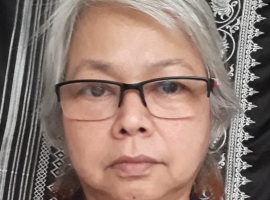
Debbie Stothard is one of Asia’s leading human rights advocates and a former Secretary-General of the International Federation for Human Rights (FIDH).
A key focus of Debbie’s advocacy has been human rights and democracy in Myanmar and in 1996 she established Alternative Asean Network on Burma (Altsean-Burma). Debbie’s involvement in DTP dates back to its early years with José Ramos-Horta, and she is a valued trainer and contributor to DTP’s work.
Over the last 30 years, Debbie has participated as a resource person in hundreds of human rights training programs, hosted by many different organisations. She said DTP’s training stands out as a unique and impactful program:
“Many human rights training programs are not flexible in terms of their content, but DTP is willing to adjust and tailor training programs to cater for the needs of the training partners and participants, and that’s an incredibly important and effective approach in ensuring participants can use the knowledge and skills they gain.”
Debbie says that she has seen the impact of DTP’s program herself. She recalls being asked to demystify how to campaign in the UN spaces like the UN Human Rights Council. “I broke it down for the activists, and then two to three years later, I met some of those activists in the UN in Geneva – and saw they were using the knowledge and tools gained from DTP.”
Debbie believes that DTP has a vital role in strengthening intra-regional solidarity among the advocates because it brings together many human rights advocates working on similar issues in different parts of the region.
“And when they start listening to the common challenges and learn about some of the solutions pursued in individual contexts, they learn from each other. They stay in touch and coordinate with each other. There has to be regional solidarity. While groups are looking at different platforms to do their advocacy, they are strengthened by realizing that they are part of a very vibrant network and are part of intersecting and interconnecting movements in the region”.
“DTP is doing precious work because the Asia-Pacific region is full of repressive regimes that learn from each other. Building effective coordination between regional human rights defenders is of paramount importance so that they could share their knowledge of resistance amongst each other.”
Debbie believes human rights activism is a vital part of non-violent resistance.
“It gives us space and pathways to non-violent resistance and non-violent solutions. Working in human rights allows me to live according to my beliefs, which is quite a luxury in this day and age”.
DTP acknowledges the traditional custodians of the land on which we work, the Bedegal people of the Eora Nation. We recognise their lands were never ceded, and we acknowledge their struggles for recognition and rights and pay our respects to the Elders – past, present – and the youth who are working towards a brighter tomorrow. This continent always was and always will be Aboriginal land.
Aboriginal and Torres Strait Islander peoples should be aware that this website contains images or names of people who have passed away.
DTP acknowledges the traditional custodians of the land on which we work, the Bedegal people of the Eora Nation. We recognise their lands were never ceded, and we acknowledge their struggles for recognition and rights and pay our respects to the Elders – past, present – and the youth who are working towards a brighter tomorrow. This continent always was and always will be Aboriginal land.
Aboriginal and Torres Strait Islander peoples should be aware that this website contains images or names of people who have passed away.
Privacy Policy | Terms of Use | Disclaimer | Policies
© 2022 Diplomacy Training Program | ABN 31 003 925 148 | Web Design by Studio Clvr